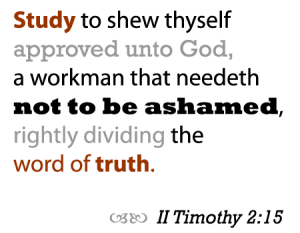The old error of a tribulation rapture of the Church (the Body of Christ) has returned and some King James Bible folks are falling for it. Like other erroneous doctrines, spiritualization of the scriptures is the shaky backbone of the Mid-tribulation rapture theory.
Recently a popular TV evangelist said he knew for sure that the Church would go through the Tribulation period because the Church was in Revelation 1-2-3, and in Revelation 4, only John was raptured up to heaven. Therefore, the Church is not raptured before the Tribulation and will go through the Tribulation. Then, he went on to say that the “saints” were mentioned many places from Revelation 4 on ( He assumed that every time the word “saint” appears it refers to a church member!)
This just goes to show you how fouled up folks are on the Church and the Rapture, as well as the Book of the Revelation and the Bible in general. In an attempt to add authority to this brilliant interpretation, he reminded his hearers that he had consulted the Greek and Hebrew on his view as well as “many scholars”. He forgot or never noticed that the same churches in Revelation 1-2-3 were told again in Revelation 22 that the book was written to them. (Revelation 22:16). And, the idea that all Bible “saints” are church members is just too silly to comment on.
To bring us back to sanity, may we simply read the book and believe exactly what it says where it says it?
THE Revelation of Jesus Christ, which God gave unto him, to shew unto his servants things which must shortly come to pass; and he sent and signified it by his angel unto his servant John: Who bare record of the word of God, and of the testimony of Jesus Christ, and of all things that he saw. Blessed is he that readeth, and they that hear the words of this prophecy, and keep those things which are written therein: for the time is at hand.
First, the book is “the revelation of Jesus Christ.” It is a detailed account of His revelation, the revealing return of Him, the things that immediately occur surrounding His Second Coming and those things which follow. It is not the “book of revelationS” as it is so often misquoted. Read it carefully and you will see it is not primarily “John’s revelation” that he gives, but that the Book of Revelation is that revelation which God the Father gave unto Jesus Christ, the Son of God, and that Jesus sent it by His angel to His servant John, who was told to write. (That the book is “John’s Revelation” Is only in a secondary sense. He was the human instrument used in writing it. By inspiration, he wrote of the events, people, etc., that God the Son gave to him).
Immediately, a cry and color rises from those who can’t read. “How can this be?” You mean God gave to His Son the events that were to happen? Impossible, Jesus is God and He knows everything!” Before you fly off the handle, read this:
“But of that day and that hour knoweth no man, no, not the angels which are in heaven, neither the Son, but the Father.” (Mark 13:32)
When He was manifest in the flesh, the Son of God, the Second Member of the Godhead, not only limited Himself to a physical body, He willingly limited Himself of the knowledge of certain prophetic events and the timing of them. There is a large amount of study related to the incarnation which we do not have time to cover here but suffice it to say, that in order for Him to make a legitimate offer of the Kingdom to Israel, and to be a “minister of the circumcision” (Romans 15:8) and be able to truly and infallibly preach to Israel, it was a necessary limitation. The context of that statement in Mark concerned the very things of the Book of Revelation.
On another occasion, when the disciples wanted to be seated with Him in His Kingdom, He plainly told them, “And he saith unto them, Ye shall drink indeed of my cup, and be baptized with the baptism that I am baptized with: but to sit on my right hand, and on my left, is not mine to give, but it shall be given to them for whom it is prepared of my Father.” (Matthew 20:23). In no way does this remove or reduce His divinity anymore than being susceptible to thirst, hunger, and even death removed His divinity. Jesus was 100% man without sin and also 100% God, “manifest in the flesh” (1 Timothy 3:15): One Person but with two natures. His divinity guaranteed His Person was sinless. His life in the flesh was above, beyond, and without sin.
—continued next week

